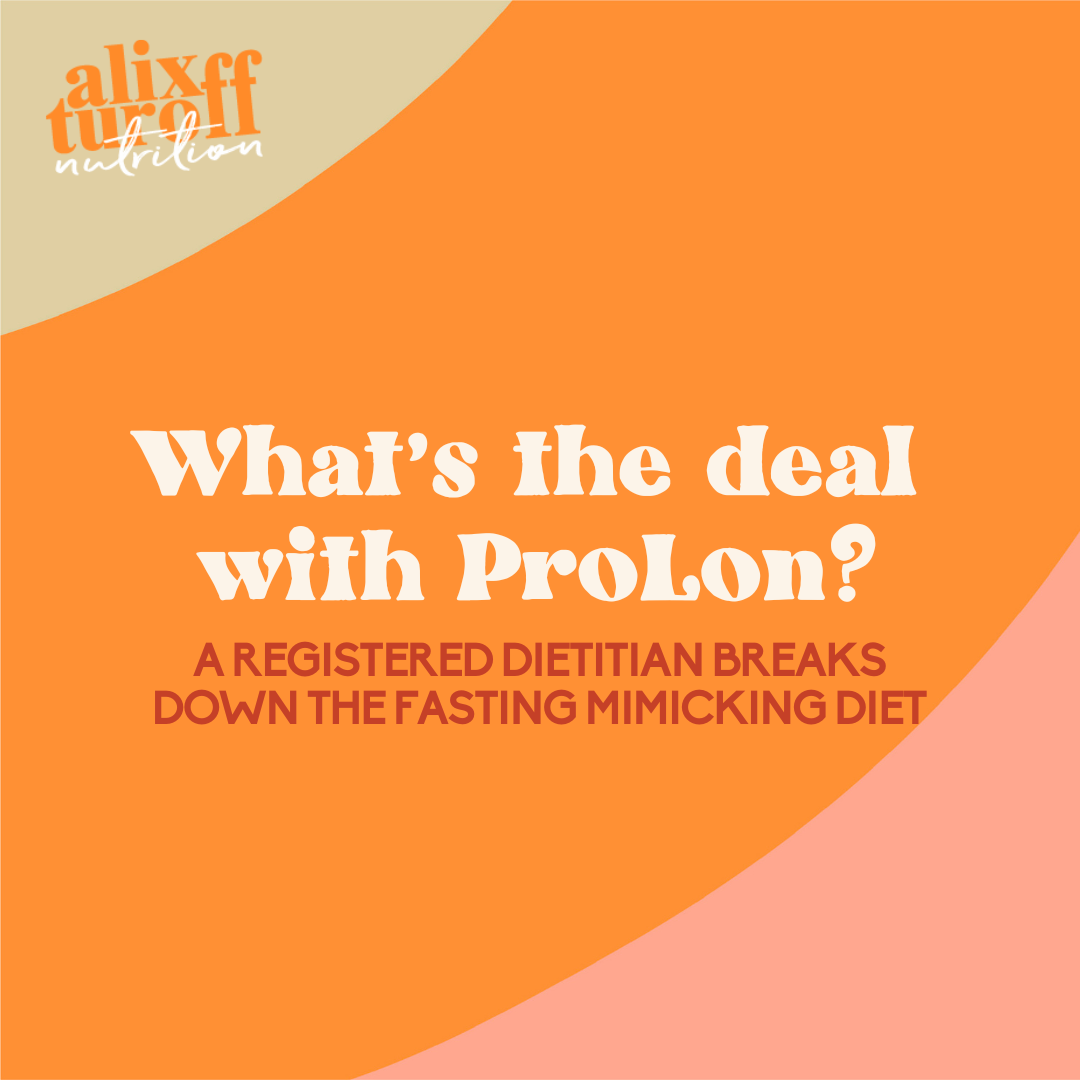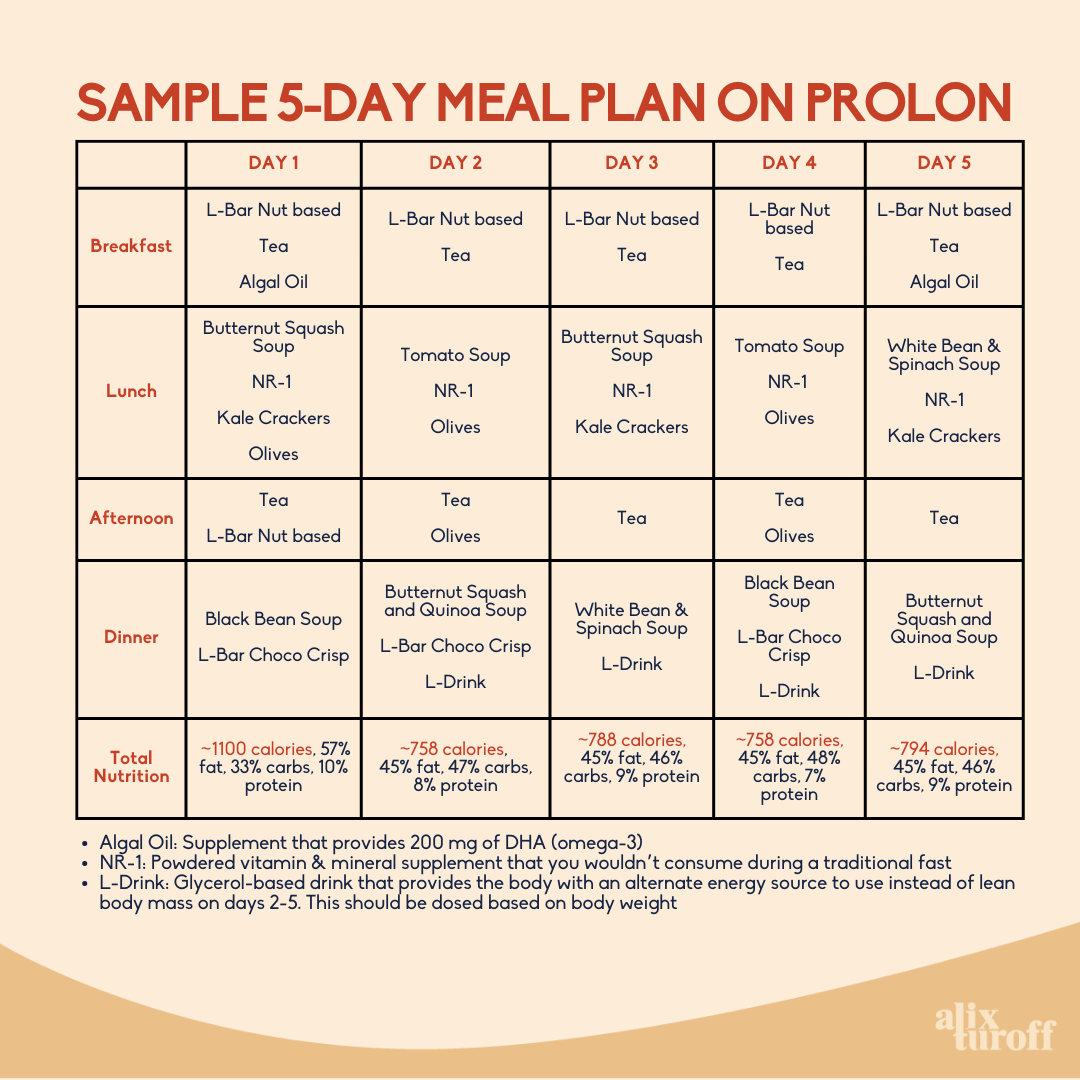What is Prolon?
-
ProLon is a 5-day Fasting Mimicking Diet (FMD) developed by Dr. Valter Longo, Ph.D, an Italian biochemist and researcher.
-
Dr. Longo is the Director of the Longevity Institute at the University of Southern California and has spent much of his career researching the mechanisms of aging and longevity in mice and how that translates to humans.
-
Through his research, he developed a FMD that would allow people to reap the longevity benefits of a prolonged fast without having to completely abstain from food…. Enter, ProLon (which stands for “pro-longevity”)
-
Purported benefits of ProLon: cellular clean-up, weight loss, enhanced clarity, and increased energy
-
The first time you do ProLon, it is recommended you do it once per month for 3 consecutive months and then consulting with a health care provider who may recommend you continue it monthly or once every 3-6 months based on your goals
-
Cost: $187 for a single ProLon box (Discounts are available with promo codes or when purchasing more than one box at a time)
-
Calories range from 1100 calories on day 1 to 750-800 calories on days 2-5
The Clinical Trial
Objective:
-
To evaluate the impact of a Fasting Mimicking Diet on biomarkers and risk factors for metabolic syndrome and longevity
Study design:
100 participants enrolled in a 3-month study and were split into 2 groups:
-
Group 1 (control): instructed to not change their usual eating habits for the full 3 months
-
Group 2 (FMD): instructed to not change their usual eating habits except to consume a FMD for 5 days once per month for a total of 3 times throughout the study
What was measured:
-
Changes in metabolic risk factors and biomarkers associated with longevity (fasting glucose, blood pressure, blood lipids, C-reactive protein, IGF-1, and body composition via a DXA scan)
Results:
-
The FMD group saw reductions in weight*, BMI, body fat, waist circumference and IGF-1 compared to the control group
-
*Participants lost 5.7 lbs on average over the 3 month period
-
Discussion & Limitations:
-
A total of 18 participants (5 in the control group, 13 in the FMD group) dropped out of the study
-
While reductions in weight, BMI, body fat, waist circumference and IGF-1 were observed in the FMD group, there were no differences observed for other metabolic risk factors (fasting glucose, triglycerides, total cholesterol, LDL-cholesterol, HDL-cholesterol, or C-reactive protein)
-
The FMD was compared to a control group who were not assigned any intervention so we don’t know if the effects observed in the FMD group are attributed to weight loss or the specific FMD protocol
-
This study was only 3 months long- we have no way of knowing if this intervention would be sustainable long term
ProLon vs. Intermittent Fasting
Intermittent fasting (IF) typically involves fasting for < 2 days and involves alternating between periods of eating and fasting.
-
Examples: Time-Restricted Eating (16:8), Alternate Day Fasting, 5:2, One Meal A Day (OMAD)
-
Shorter fasts do not trigger a cellular stress-resistant fasting state
-
Weight loss can occur as a result of a caloric deficit created by IF
-
ProLon is a form of periodic prolonged fasting which usually refers to fasts lasting > 2 days
-
Prolonged fasts down-regulate nutrient-sensing pathways
-
The body switches from using glucose as fuel to using fatty acids and ketones
-
-
Triggers autophagy which is the clean up of old, worn-out cellular debris resulting in cellular rejuvenation and renewal
The Logistics
-
From the ProLon website: “ProLon is intended for use by healthy individuals who want to enhance their health and well-being and by individuals who struggle with weight and want to proactively manage their weight in an easy and healthy way.”
-
ProLon should be followed for 5 consecutive days followed by a transition day (day 6) before resuming your normal diet
-
ProLon ingredients are primarily plant-based and gluten-free
-
ProLon meals come in 5 boxes (one for each day) and includes energy bars, soups, kale crackers, olives, drinks (herbal tea & L-drink) and supplements (algal oil and NR-1)
-
The program includes a meal card that shows you which items to consume on each day items cannot be carried over to the next day)
-
Light activity (walking or stretching) is recommended to help you “stay in the moment” and distract you from thinking about your food cravings (intense exercise should be avoided)
-
Calories range from 1100 cals on day 1 to 750-800 cals on days 2-5
-
Everyone (regardless of weight) receives the same amount of food and calories as this is how ProLon was found to be effective at inducing a fasting state. The L-drink is dosed based on body weight
-
No other food or liquid (other than water or herbal decaf tea) should be consumed
-
If your hunger is intolerable, you may have:
-
1-2 slices of apple OR
-
1 stalk celery OR
-
1 small Persian cucumber (5-6” length)
-
-
Approved additions to the program:
-
Up to 1 tablespoon of dried herbs or spices per day
-
Up to 1 teaspoon of sea salt
-
Up to 2 slices of lemon per day (squeezed, not eaten)
-
Up to 2 pieces of sugar-free gum per day
-
Unlimited unsweetened and caffeine-free Herbal teas
-
Sparkling water (no sweeteners of any kind)
-
Caffeine up to 140mg per day (no cream or sweeteners)
-
-
You should not do ProLon if:
-
You are <18 years old or >70 years old without direct evaluation and supervision by a healthcare provider.
-
Have a pre-existing condition or are taking any prescription medications without consulting with a healthcare professional
-
You have a fever, cough, diarrhea, signs of an active infection, or are at risk for recurrent infection
-
You are underweight, breastfeeding, or pregnant
-
You have dietary restrictions
-
You have a known, suspected, or diagnosed eating disorder
-
My Perspective
ProLon was created so people could get the longevity benefits of prolonged fasts without having to completely abstain from food, BUT… while I’m sure some people are interested in the longevity benefits, many will try this for the promise of weight loss & the marketing reinforces that
-
In the FAQ section on the ProLon website, they suggest it could be used “… by individuals who struggle with weight and want to proactively manage their weight in an easy and healthy way.”
-
Throughout the website, there are numerous mentions to ProLon being a good option for weight loss and even a way to change your relationship with food “after just 5 days”
-
They rely heavily on popular influencers to market the program who seem to have unhealthy views around food
-
I used the Meta (Facebook) ad library to see what types of ads ProLon is currently running and a few things stuck out as pretty problematic:
-
“After day 5, I felt accomplished, was 8 lbs lighter…”
-
“Resets my gut… all hot girls have stomach problems”
-
“Overdid it this weekend and looking to reset?”
-
“The fast where eating isn’t cheating”
-
“Burn fat fast”
-
-
-
There are no studies comparing ProLon to a more moderate caloric deficit. The average weight loss on ProLon after 3 cycles (3 months) was 5.7 lbs. This could be achieved by something far less extreme.
-
It’s also important to note that weight cycling (losing and regaining weight) is correlated with negative physical and psychological health consequences and if doing something like ProLon leads to more yo-yoing in weight, then it’s safe to assume you’re outdoing any potential benefits for longevity.
-
While we have a good amount of research pointing to the benefits of fasting in mice and rodent studies, we don’t have a ton of research in humans. This is partially because it’s hard to get funding for some research but largely because we can’t lock people up for years at a time and force them to fast regularly.
-
In between bouts of ProLon, Longo recommends a diet high in complex carbs (~60% of calories), moderate fat (30% calories) and low in protein (10% of calories) from primarily plant-based sources with some fish mixed in. He details this in his book The Longevity Diet. If someone does ProLon and returns to their regular diet, will they still experience the benefits?
-
I’ve had clients who have done ProLon prior to working together as a way to “reset” their mindset around food. For them, they found having something very prescriptive helped them then transition into a more flexible diet with less processed food overall. I can see this being a decent tool for someone who doesn’t experience any disordered eating tendencies.
-
While I do think there’s some convincing research coming out of Longo’s lab, I remain pessimistic about how the majority of consumers are going to use this program. After all, is it really about longevity if you’re using this as a reset after a week of binge drinking at Coachella or in the weeks leading up to your wedding?


